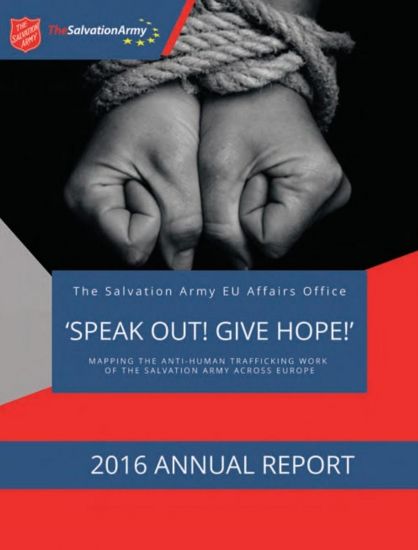New report reveals extent of Army's anti-trafficking ministry across Europe
New report reveals extent of Army's anti-trafficking ministry across Europe
 The new Salvation Army report which gives a voice to those directly affected by exploitation.
The new Salvation Army report which gives a voice to those directly affected by exploitation.
“Speak Out! Give Hope!” is the title of a new report mapping The Salvation Army’s anti-trafficking work across Europe. Published by The Salvation Army's European Union (EU) Affairs Office, based in Brussels, Belgium, the paper explains the background and context for this vital work, contextualising it within the refugee crisis that has also affected many parts of the continent.
In his foreword, Major Mike Stannett, Head of The Salvation Army’s EU Affairs Office, writes: “Human trafficking and those who are responsible for the exploitation of fellow human beings in this way is bad enough but, on top of that, the fact that governmental systems, EU policies and the lack of political will to address the underlying causes conspire to increase the risk of such exploitation is equally distressing. The Salvation Army has highlighted anti-human trafficking as one of its major concerns of the 21st century and is seeking to “speak out and give hope” by providing services and support to victims and survivors of this dreadful trade in human misery.”
Additionally, the Chair of The Salvation Army’s European Anti-Human Trafficking Task Force, Jeroen Hoogteijling, explains: “We are deeply committed to establish ‘safe havens’ for victims of trafficking where their lives can be restored and where they receive the support they need for rebuilding their lives towards sustainable (re)integration in the local community.”
Data quoted from a 2013 Eurostat report suggests that as many as 880,000 people may be in forced labour within EU countries. Europol (the European Union’s law enforcement agency) statistics indicate that 70 per cent of identified victims and suspects are EU nationals.
The Salvation Army established its International Anti-Human Trafficking Task Force in July 2015, with the purpose of promoting, encouraging, supporting and coordinating a response across The Salvation Army’s 128 countries. It is rooted in the biblical teaching that nobody should be exploited or damaged. To this end, national anti-trafficking representatives have been appointed in 23 European countries, from Norway to Greece and Portugal to the Ukraine. The response takes different forms across Europe, detailed within the country report section of the document. In this section, The Salvation Army’s national and international plans, projects and challenges are clearly laid out.
Speak Out! Give Hope! also seeks to give a voice to those directly affected by this exploitation. One such survivor, Kiya, observed frankly: “To the men who buy us, we are like meat. To everybody else in society, we simply do not exist.” Poverty and and unemployment are highlighted as creating vulnerability that leads to increased levels of trafficking. Ferda, a male victim from the Czech Republic who was offered “somewhere to live and a part-time job” by traffickers, told The Salvation Army that he was “working 12 hours a day, six days a week – for very little”. As his physical and mental health deteriorated and he was unable to work, he was evicted and left on the streets.
The report makes recommendations to further develop The Salvation Army’s anti-trafficking response, including enhanced training and awareness-raising, but also challenges the EU and member states in their reaction to trafficking. The report describes the legal framework in some European countries as a “hindrance to the protection of victims or potential victims”, and calls on governments to “improve their coordination of handling victims ... ensuring particularly vulnerable people such as asylum seekers or unaccompanied children do not go missing”.
Amongst its conclusions, the report recommends that the EU provides funding opportunities for long-term prevention and rehabilitation programmes for potential victims of trafficking and strengthens the monitoring and protection of unaccompanied children among refugees in EU countries. The development of an EU-wide system for data collection is also suggested, along with the establishment of a “victim first” principle.
Speak Out! Give Hope! is available to download at sar.my/speakout